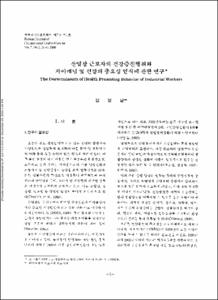산업장 근로자의 건강증진행위와 자아개념 및 건강의 중요성 인식에 관한 연구
- Keimyung Author(s)
- Kim, Chong Nam
- Department
- Dept. of Nursing (간호학)
- Journal Title
- 한국산업간호학회지
- Issued Date
- 1998
- Volume
- 7
- Issue
- 1
- Abstract
- This descriptive-correlational study was conducted to identify the major factors affecting health promoting behaviors.
344 workers who employed in four different manutacturing plants in Taegu and Kyungbuk area were selected by convenience sampling method. Data were collected from April let to April 18th, 1998 by ready structured questionaires.
The purpose of this study was to offer the basic data for health promotion theory development and health promotion strategy planning.
This study was based on Pender's Health Promotion Model and examined three variables health promoting behavior, self-concept and perceived importance of health. The Life Style and Health Habit Assessment scale(LHHA) developed by Pender(1982).The Self-concept scale developed by Choi(1972) and the Health Value scale developed by Wallston, Maides and Wallston(1980) were used for this study.
Data was analyzed by percentage, mean. t-test. ANOVA, Pearson Correlation Coefficient, and Stepwise Multiple Regression.
The major findings of this study are as follows :
1. The average level of health promoting behavior practice was 63.2% and possible range was from 62 to 248 point.
The mean score of respondent's positive self -concept was 75.8.
81.4% of respondents put a high priority on the importance of health.
2. There was a significant difference between the practice level in the category of general self care and less amount of working hours per day(P =0.000), less amount of working hours per week (P = 0.000).
There was a significant difference between the practice level in the category of nutrition and age(0.002), marital status(0.000), working hour per day(0.008), working hours per week(0.001), There was a significant difference between the practice level in the category of nutriton and ~ex(0.000), age(0.000), marital status(0.025), education level(0.000), working hours per day(0.002), working hours per week(0.006).
There was a significant difference between the practice level in the category of sleep and rest and age(0.003), marital status(0.002), working hours per day(0.001), working hours per week(0.001).
There was a significant difference between the practice level in the category of stress management and working hours per day (0.001), working hours per week(0.002).
There was a significant difference between the practice level in the category of self-actualization and working hours per day(0. 050).
3. General charcteristics influencing the respodent's self-concept were level(P =0.009) and worksite(P=0.001).
4. The results of the hypothesis tests are as follows The first hypothesis, that "The
respondent who have more positive self-concept will have higher scores in the practice of health promoting behavior. was supported(r =0. 2973, P =0.0001).
The second hypothesis that "The respondent who have higher perception level on importance of health will have higher scores in the practice health promoting behavior. was rejected(r = - 0665, P=0. 2225).
5. The most important factor that affects health promoting behavior practice was working hours per week (6.0%).
The cornbination of working hours per week, age, education level accounted for 10.0% of the variance in health promoting behavior.
In conclusion, the results of this study on industrial workers supported Pender's health promotion model in partial and showed th relatedness between self concept and the practice of health promoting behavior.
Further research is required to find factors influencing health promoting behaviors of industrial workers.
- Alternative Title
- The Derterminants of Health Promoting Behavior of Industrial Workers
- Keimyung Author(s)(Kor)
- 김정남
- Publisher
- College of Nursing
- Citation
- 김정남. (1998). 산업장 근로자의 건강증진행위와 자아개념 및 건강의 중요성 인식에 관한 연구. 한국산업간호학회지, 7(1), 5–19.
- Type
- Article
- ISSN
- 1225-9586
- Appears in Collections:
- 2. College of Nursing (간호대학) > Dept. of Nursing (간호학)
- 파일 목록
-
-
Download
 oak-bbb-4349.pdf
기타 데이터 / 825.59 kB / Adobe PDF
oak-bbb-4349.pdf
기타 데이터 / 825.59 kB / Adobe PDF
-
Items in Repository are protected by copyright, with all rights reserved, unless otherwise indicated.